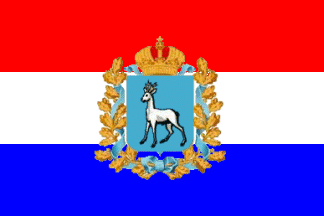
Last modified: 2014-04-27 by zoltán horváth
Keywords: samara | deer (white) | iver | kuybyshev | samara’s banner |
Links: FOTW homepage |
search |
disclaimer and copyright |
write us |
mirrors

(Note: You need an Unicode-aware software and font to correctely view the cyrillic text on this page. See here transliteration details).
After a substantial decision of the flag project, it was decided that the
Samara Oblast flag is a rectangular red-white-blue canvas, 2:3 size, with the
arms in the center.
Pascal Gross, 12 Jul 2001, quoting from
www.adm.samara.ru/en/content/5/51/675
Horizontal red / white / blue with coat
of arms in the middle (2/3 of heigth). The
ratio is 2:3 indeed. The project of Law
about State Symbols of Samara Region is
being discussed.
Michael Simakov, 29 Dec 1998 and 27 Jan 2000
The proportions of flag of Samara region are 2:3,
according to the law of Samara region About arms
of coat and flag of Samara region.
Yury Rocich, 27 Jan 2000
The flag of Samara region based on the
Samara’s Banner. But the cross
replaced by the coat of arms of the Region (white deer
on light-blue shield). Over the coat of arms, a golden
crown.
Andrey Yashlawsky, 19 Jan 1999
.gif)
In 1992 or 1993 some regions self upgraded
to constituent republics, and
used ephemeral unofficial flags. One of the main republics was Samara — flag
uncertain probably blue with same figure that in the arms.
Jaume Ollé, 15 Apr 2000
I’m sure that this flag is a fiction. I don’t know who is
author… It was adopted never and existed never.
Victor Lomantsov, 17 Apr 2000
This banner was created in 1877 by decision of
City’s Duma for bulgarian volounter’s units during
Russian-Turkish War of 1877-1878. It was made by nuns
of Samara’s Iver nunnery. It was a horizontal tricolour
(red, white and blue) with golden cross in center.
On the cross — images of Iver Virginia, St. Kirill and
St. Methody. This banner was lost in first battle with
the Turks, but later it was remade.
Andrey Yashlawsky, 19 Jan 1999
The members of the Samara Duma came up with an idea to create a flag in order to present it to the Slavs fighting against the Turks. A prominent public leader, member of the Duma, Pyotr Vladimirovich Alabin (Pëtr Vladimiroviĉ Alabin | Пётр Владимирович Алабин) and his wife Varvara Vasilyevna (Varvara Vasilevna | Варвара Василевна) took an active part in that. The artist Nickolai Efstafyevich Simakov (Nikolaĭ Evstafeviĉ Simakov | Николай Евстафевич Симаков) made the sketch. On one side of the red, white and blue canvas on a black cross, decorated with golden ornament, he showed the first Slavic teachers Kiril and Mephody. On the other side, he showed the icon of the Iverskaya God Mother, which gave the name to the nunnery later founded in Samara. It were the nuns who for free embroidered the flag.
It is considered that the flag was for the Bulgarian rebels. But by the time it was ready, the Turks had suppressed the rebellion. In April 1877, Russia declared war to Turkey. Volunteers started to form units and the Duma members decided to pass the flag on to the Bulgarian troops. On May 1(13) the flag was in Kishinyov and on May 6 (18) it was handed over to the third unit of the Bulgarian militia somewhere close to Ploeshti. On July 19 (31), 1887, the flag was "baptized" in a tough fight near the Bulgarian city Stara Zagora. Several flag-holders got killed in that fight. Among them was the Commander of the unit lieutenant — colonel P. P. Kalitin.
The Samara flag has become a historic relic for Bulgarians. The flag was given the highest military award "For Courage". On September 22, 1981, Bulgarians presented the exact copy of the flag to our city. Today it is in the Museum of the History of the Privolzhsky Military District.
Pascal Gross, 12 Jul 2001, quoting from www.adm.samara.ru/en/content/5/51/675